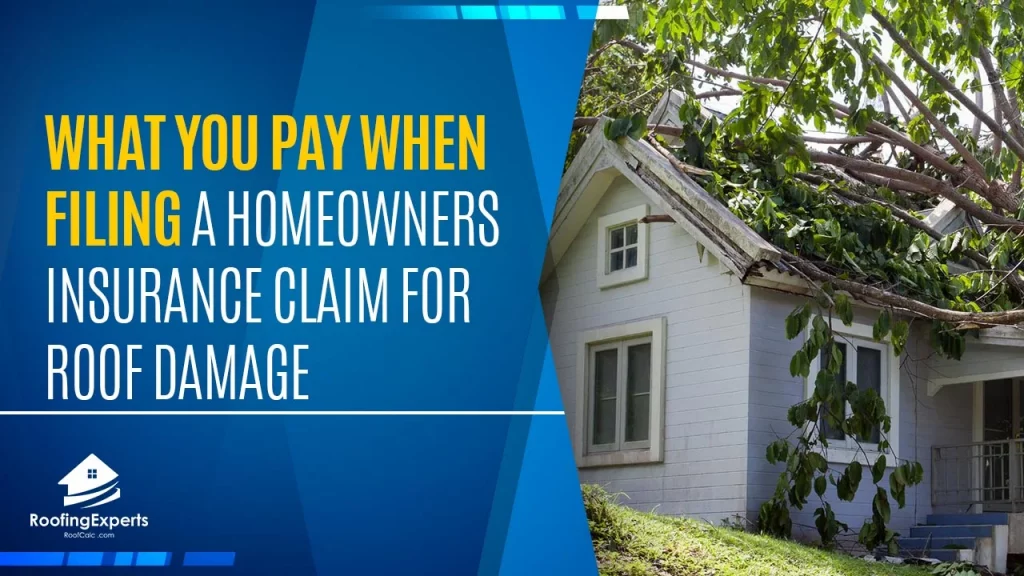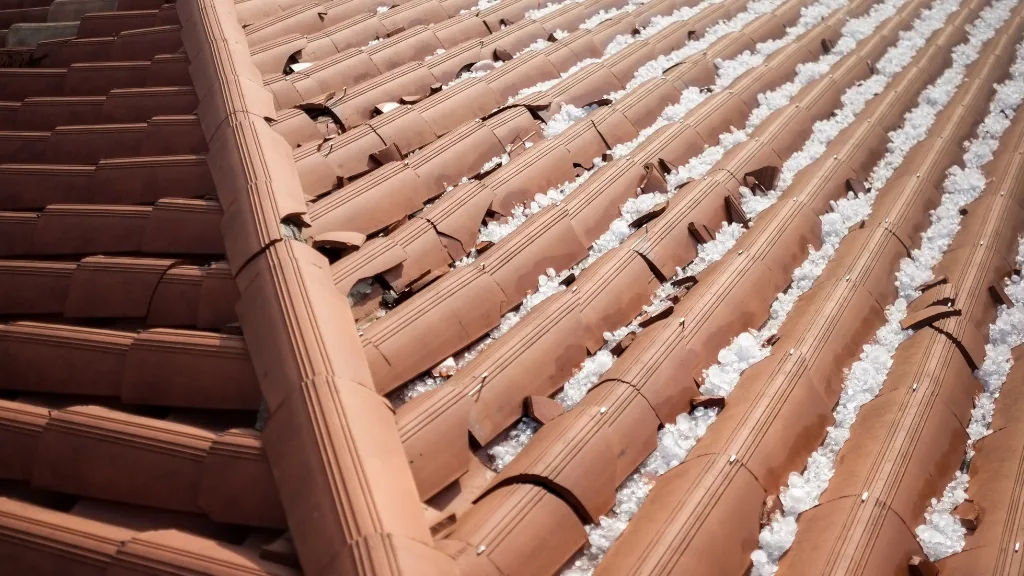
What do you pay when filing a homeowners insurance claim for roof damage? Most people don’t know the answer to this question, but it’s important that you find out.
Read on to learn about what costs are involved with an insurance claim for roof damage.
In the event of damaged roofs from storms or other natural disasters, many homeowners may wonder how much they can expect their homeowner’s insurance company to cover in terms of damages and loss recovery.
In order to get a better idea of what damages your policy covers and how much money you might have coming back if your home is damaged by a disaster, we will take a look at some common claims associated with these types of events.
Homeowners Insurance Claim for Roof Damage
The roof is one of the most important components for any home. It protects its inhabitants from harsh weather conditions and it also provides shelter to keep you safe when severe storms arise.
Unfortunately, even roofs are not protected against natural disasters like windstorms or hail damage that can do extensive damage to your property’s exterior surfaces including windows, walls, and even roofs.
In order to help you better understand what damages your policy covers when filing a homeowners insurance claim for roof damage it is important that we review the most frequently occurring claims filed with insurers in this regard:
Damage from Hail
In case of hail-related damages to your property’s exterior surfaces such as windows and roofs, chances are that your insurer will cover the cost of replacing or repairing any broken glass pieces and also paying for repairs to remove loose debris.
If you’re wondering what damages might be covered in terms of roofing materials it is important that we note that most insurance companies tend to only pay out if the entire roof was damaged due to the severity of hail.
Heavy Rainfall and Thunderstorms
Another common homeowners insurance claim for roof damage is documented as a result of heavy rainfall and thunderstorms, which lead to water-related damages such as flooding or leaks in your home’s walls and ceilings.
In case the damage resulting from wet weather conditions was caused by faulty installation, inadequate maintenance of your property’s drainage system, or even a blocked gutter – your insurer will only cover the actual costs you have to pay for repairs.
In case of faulty installation and inadequate maintenance, most insurers do not provide coverage as these are considered pre-existing damages that were present before the storm occurred.
In order to protect yourself from being sued by your insurer for incomplete or faulty repairs, it is advisable that you choose a professional roofing contractor with extensive experience and knowledge in this area.
Even if you do not have enough money to pay for the repairs, hiring a roofing contractor with extensive experience and knowledge in this area will help your insurance company verify that all damages were repaired properly.

Things to Know Before Filing an Insurance Claim
Let’s discuss a bit about what you have to know before you file for a claim.
What Damage is Covered by the Claim?
The first thing to know before filing a claim is what damage it covers. Your insurance policy can help you understand the types of damages that are covered by your homeowner’s insurance claim for roof damage.
For instance, if there was widespread windstorm or hail damage, then you would have no problem getting reimbursed for just about any type of exterior damage.
However, standard homeowner’s insurance policies may exclude damage resulting from floods and earthquakes.
If your home is near a flood zone or in an earthquake-prone area, then you may want to consider getting additional coverage.
Contact an Insurance Company BEFORE A Roofing Contractor
The next thing you are going to want to do before filing a claim is contact your insurance company.
The policy will have specific procedures for reporting an event and the procedure may be different depending on whether or not it was storm-related damage, fire, etc., so read carefully through your homeowner’s insurance claim for roof damage policies.
If there is damage that is not covered by your policy, then you may want to consider using an umbrella policy. This type of insurance will cover things like accidental damage due to weather or other natural disasters.
One thing your agent can tell you about filing a homeowners insurance claim for roof damage with an umbrella policy is whether the costs are reimbursed as actual cash value or replacement cost.
Does the Roofing Contractor Work with Insurance Claims?
Before you hire a contractor for your roof repair, call their references and ask whether they have insurance to cover damages that might occur during the course of work or if any accidents happen on site.
You can also check with their state license board to see what complaints have been filed against them.
Contractors who are insured will typically have you sign a contract that includes language about what is covered by the insurance company and how to file a claim with your insurer if an accident does happen.
An important thing to keep in mind when filing any type of home insurance claim is whether or not it was storm-related damage, fire, etc., so read carefully through your homeowner’s insurance claim for roof damage policies.
If there is damage that is not covered by your policy, then you may want to consider using an umbrella policy. This type of insurance will cover things like accidental damage due to weather or other natural disasters.
One thing your agent can tell you about filing a homeowners insurance claim for roof damage with an umbrella policy is whether the costs are reimbursed as actual cash value or replacement cost.

Does the Roofing Contractor Work with Insurance Claims?
Before you hire a contractor for your roof repair, call their references and ask whether they have insurance to cover damages that might occur during the course of work or if any accidents happen on site.
You can also check with their state license board to see what complaints have been filed against them.
Contractors who are insured will typically have you sign a contract that includes language about what is covered by the insurance company and how to file a claim with your insurer if an accident does happen.
Important things to keep in mind when filing any type of home insurance claim are what damage it covers, contacting your insurer before making a final decision about roof repairs, and whether or not the contractor you hire is insured.
Be sure what you have to prepare before you file for the claim, what your contractor is insured for, and if they are working with an insurance company.

